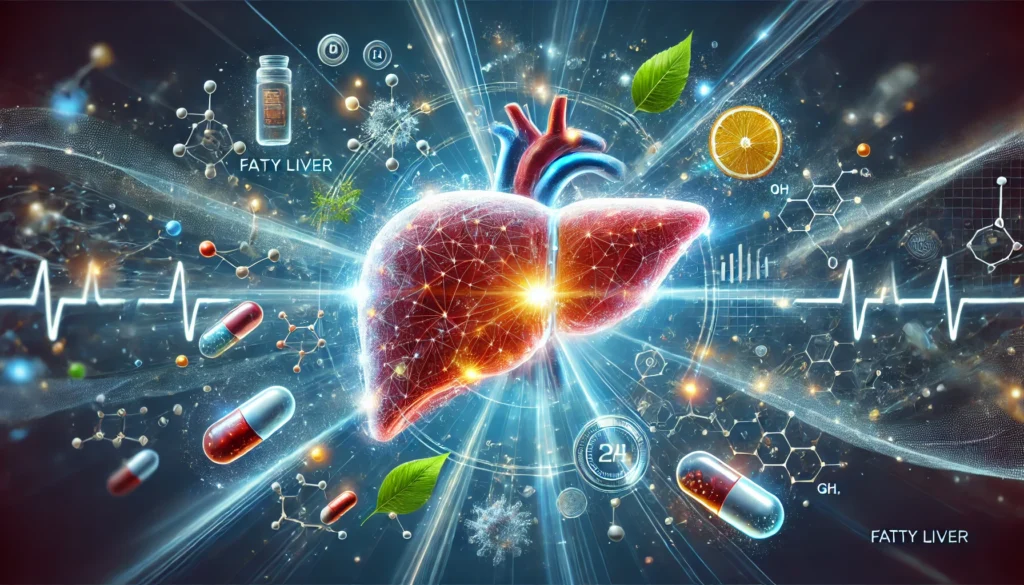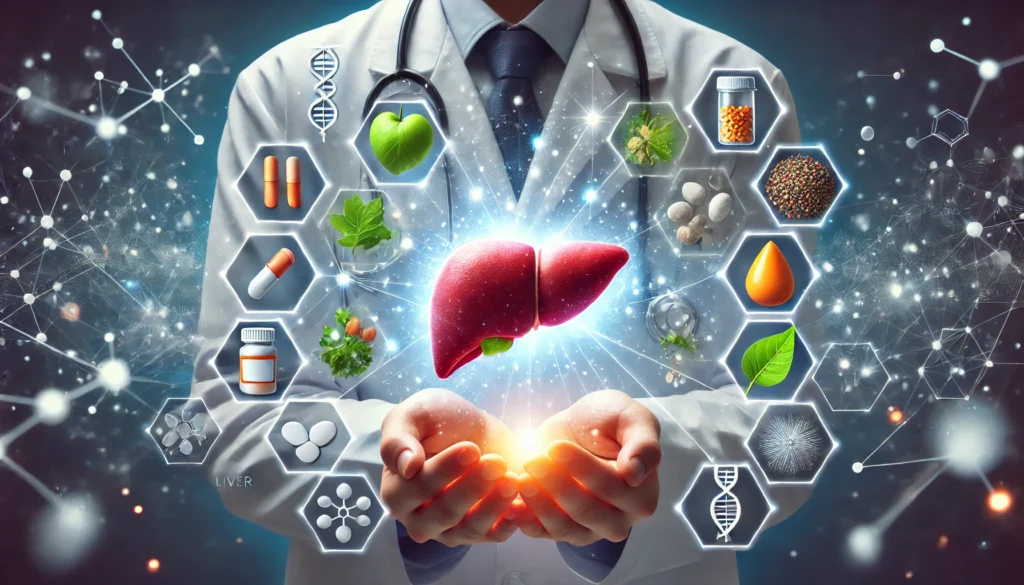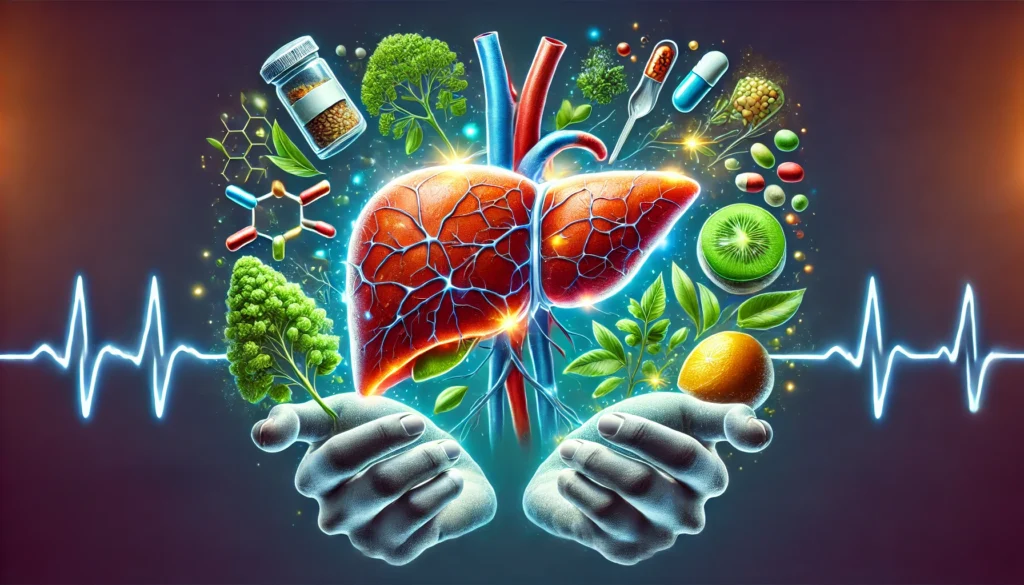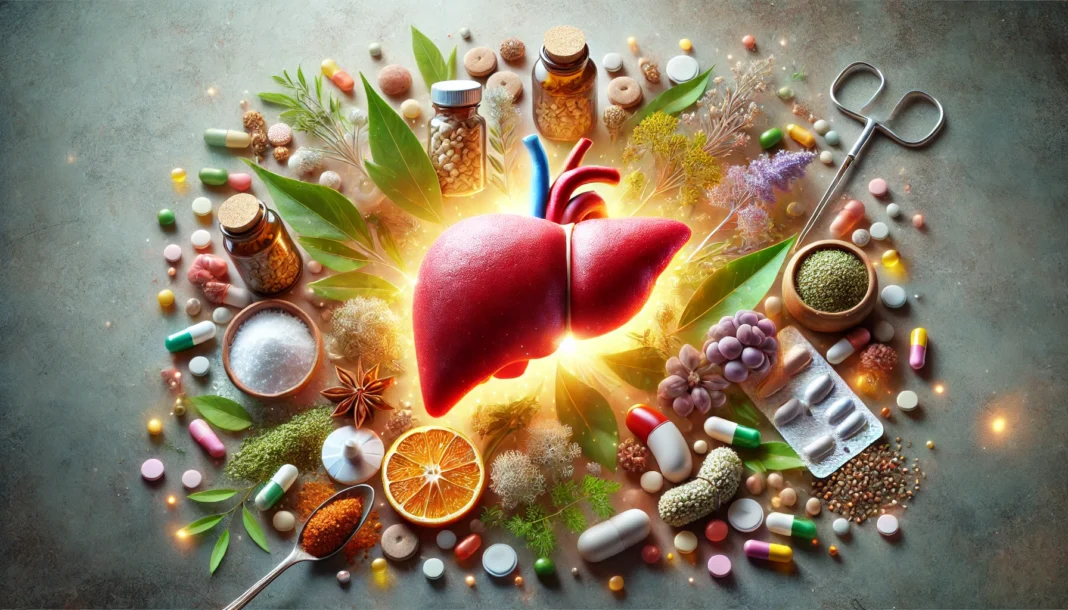Fatty liver disease, a condition characterized by excessive fat accumulation in the liver, is increasingly prevalent worldwide. As lifestyles become more sedentary and diets grow richer in processed foods, the incidence of fatty liver disease continues to rise, necessitating effective treatment strategies. While lifestyle modifications remain the cornerstone of managing this condition, many individuals seek medical interventions to complement their efforts. This article explores the best medication for fatty liver, examining various drugs for liver disease, their mechanisms of action, and their role in liver health. Understanding the nuances of liver medication is crucial for both patients and healthcare providers striving to mitigate the risks associated with fatty liver disease.
You may also like: The Best Liver Detox Supplements: How to Choose Safe and Effective Support for Your Liver
Understanding Fatty Liver Disease: Causes and Risk Factors
Fatty liver disease exists in two primary forms: nonalcoholic fatty liver disease (NAFLD) and alcoholic fatty liver disease (AFLD). NAFLD is driven by metabolic risk factors such as obesity, type 2 diabetes, and insulin resistance, whereas AFLD results from excessive alcohol consumption. Both conditions can progress to more severe liver complications, including nonalcoholic steatohepatitis (NASH), fibrosis, cirrhosis, and even liver cancer if left untreated. Recognizing the risk factors and addressing them early is essential to preventing disease progression.
Obesity is one of the strongest predictors of fatty liver disease, with excess body fat contributing to insulin resistance and inflammation in the liver. Type 2 diabetes further exacerbates liver fat accumulation by impairing glucose metabolism. High cholesterol and triglyceride levels are also associated with fatty liver disease, as excessive lipids deposit in the liver. Other risk factors include poor dietary choices, sedentary lifestyles, genetic predisposition, and underlying medical conditions such as polycystic ovary syndrome (PCOS) and hypothyroidism. Identifying these risk factors is the first step in implementing effective treatment strategies, including the use of medication for liver problems.

The Role of Medication in Treating Fatty Liver Disease
Although no FDA-approved medications specifically target fatty liver disease, several drugs have shown promise in treating its underlying causes. Physicians often prescribe medications to manage associated conditions such as insulin resistance, inflammation, and lipid imbalances, thereby reducing liver fat accumulation. The best medication for fatty liver depends on an individual’s specific health profile and the severity of their condition.
Metformin, a widely used diabetes drug, has demonstrated benefits in reducing liver fat content by improving insulin sensitivity. While not officially approved for fatty liver disease, many clinicians incorporate it into treatment plans for patients with concurrent diabetes or insulin resistance. Another promising class of medications is the glucagon-like peptide-1 (GLP-1) receptor agonists, such as liraglutide and semaglutide, which help regulate blood sugar levels and promote weight loss—both critical factors in managing fatty liver disease. Research suggests that these drugs for liver disease may reduce inflammation and slow the progression of NAFLD.
Lipid-Lowering Medications and Their Impact on Liver Health
Given the strong link between dyslipidemia and fatty liver disease, lipid-lowering medications play a significant role in treatment. Statins, commonly prescribed to lower cholesterol levels, have been shown to reduce liver inflammation and improve liver enzyme levels in patients with NAFLD. Despite initial concerns about their potential to cause liver damage, recent studies indicate that statins are generally safe for individuals with fatty liver disease and may even offer protective benefits.
Fibrates, another class of lipid-lowering medications, target high triglyceride levels, which are often elevated in patients with fatty liver disease. Drugs such as fenofibrate and gemfibrozil help reduce liver fat by enhancing lipid metabolism. While they are primarily used to manage cardiovascular risk factors, their role in fatty liver treatment is increasingly recognized. Additionally, omega-3 fatty acids, found in fish oil supplements, have demonstrated efficacy in reducing liver fat and inflammation, making them a valuable adjunct therapy for fatty liver disease.
Anti-Inflammatory and Antifibrotic Medications
Inflammation is a key driver of disease progression in fatty liver patients, making anti-inflammatory medications an important aspect of treatment. Pioglitazone, a thiazolidinedione drug used for diabetes management, has shown promise in reducing liver inflammation and fibrosis. Although it is not specifically approved for fatty liver disease, clinical trials indicate that it improves liver histology and reduces the risk of disease progression.
Vitamin E, an antioxidant, has been extensively studied for its potential benefits in NAFLD and NASH. Research suggests that high doses of vitamin E can reduce oxidative stress and inflammation in the liver, leading to improved liver function. However, long-term use of high-dose vitamin E is associated with certain risks, such as an increased likelihood of bleeding and prostate cancer in men, necessitating careful medical supervision.
Emerging Therapies and Future Directions
As research into fatty liver disease advances, several novel therapies are undergoing clinical trials. Farnesoid X receptor (FXR) agonists, such as obeticholic acid, are being investigated for their ability to regulate bile acid metabolism and reduce liver fat accumulation. Other promising drug candidates include peroxisome proliferator-activated receptor (PPAR) agonists, which target multiple metabolic pathways involved in fatty liver disease.
Gene-based therapies and personalized medicine approaches are also gaining traction in the field of hepatology. Understanding the genetic factors that contribute to fatty liver disease may enable the development of targeted treatments tailored to individual patients. While these therapies are still in the experimental stage, they hold significant potential for revolutionizing fatty liver disease management.

Frequently Asked Questions (FAQ) About Liver Medication and Treatment
1. What are the most effective types of medication for liver disease?
The effectiveness of medication for liver disease depends on the specific condition being treated. For example, antiviral medications are commonly prescribed for hepatitis B and C, while corticosteroids and immunosuppressants are used for autoimmune liver diseases. In cases of fatty liver disease, doctors often recommend a combination of lifestyle changes and certain liver medication, such as vitamin E or insulin-sensitizing drugs. Some emerging treatments focus on antifibrotic drugs that target liver scarring to prevent progression to cirrhosis. Patients should always work with their healthcare provider to determine the best medication for their specific liver problems.
2. How does medicine for liver health work in the body?
Medicine for liver health typically works by addressing the underlying cause of liver damage. Some drugs for liver disease aim to reduce inflammation, while others improve bile flow or prevent fat accumulation in liver cells. In chronic liver diseases such as cirrhosis, certain medications can slow down fibrotic tissue formation and help maintain liver function for as long as possible. Additionally, antioxidants and hepatoprotective agents can help mitigate oxidative stress, which plays a significant role in liver damage. The right medication regimen depends on the individual’s liver condition and overall health status.
3. What is the best medication for fatty liver, and how does it help?
The best medication for fatty liver varies depending on whether the condition is non-alcoholic fatty liver disease (NAFLD) or alcoholic fatty liver disease (AFLD). While no single drug has been universally approved for NAFLD, physicians often prescribe insulin sensitizers like pioglitazone or GLP-1 receptor agonists to improve metabolic function. Vitamin E supplements have shown promise in reducing liver inflammation in some patients with non-alcoholic steatohepatitis (NASH). Emerging research suggests that SGLT2 inhibitors, originally developed for diabetes, may also offer protective effects for fatty liver. Ultimately, combining meds for fatty liver with dietary changes and exercise yields the best results.
4. Are there natural alternatives to liver medication?
Certain natural compounds have shown hepatoprotective properties, though they should never replace prescribed liver medication without a doctor’s guidance. Milk thistle, for instance, contains silymarin, an antioxidant known to support liver health. Turmeric and its active compound curcumin have been studied for their potential anti-inflammatory effects on liver tissue. Omega-3 fatty acids from fish oil may also help reduce liver fat accumulation, particularly in individuals with NAFLD. However, these supplements should be used as complementary therapies rather than substitutes for clinically approved drugs for liver disease. Always consult a healthcare professional before incorporating herbal or natural remedies.
5. Can liver medication reverse liver damage?
While some forms of medication for liver problems can slow or even partially reverse certain types of liver damage, the extent of recovery depends on the severity of the condition. For example, antiviral drugs for hepatitis B or C can significantly reduce viral load and prevent further liver injury. Some antifibrotic medications are being developed to help minimize scarring in liver fibrosis and cirrhosis. However, in advanced liver disease, the damage is often irreversible, and management focuses on slowing progression and improving quality of life. Early intervention with appropriate treatment can greatly improve long-term liver health outcomes.
6. What are the potential side effects of drugs for liver disease?
Like all medications, liver medication can come with side effects. Some common adverse reactions include nausea, fatigue, and digestive issues. In some cases, certain medicines for liver conditions may impact kidney function or blood sugar levels, requiring close monitoring. Immunosuppressive drugs used for autoimmune liver diseases may increase susceptibility to infections. It’s crucial to discuss potential side effects with a healthcare provider to weigh the benefits of treatment against any risks. Patients should never stop taking prescribed liver medication without medical guidance, as this could worsen their condition.
7. How long does it take for liver medication to show results?
The timeline for liver medication effectiveness varies depending on the type of drug and the specific liver disease being treated. Antiviral medications for hepatitis can show results within weeks to months, with viral suppression being a key indicator of effectiveness. Meds for fatty liver typically require months of consistent use alongside dietary and lifestyle changes before significant improvement is seen. Drugs targeting liver fibrosis may take longer, as reversing scarring is a gradual process. Regular liver function tests can help monitor progress and determine if adjustments to treatment are needed.
8. Can I take liver medication with other prescription drugs?
Some liver medications can interact with other prescription drugs, altering their effectiveness or causing unwanted side effects. For example, certain antibiotics, painkillers, and cholesterol-lowering medications can affect liver enzyme activity, potentially leading to toxicity. People taking multiple medications should inform their healthcare provider to avoid harmful drug interactions. Liver disease patients should also be cautious about over-the-counter pain relievers like acetaminophen, which can be harmful in high doses. A healthcare professional can recommend safer alternatives based on an individual’s specific condition and treatment plan.
9. How do lifestyle changes complement medication for liver problems?
While liver medication plays a crucial role in managing liver disease, lifestyle changes can significantly enhance treatment effectiveness. A diet rich in whole foods, lean proteins, and healthy fats supports liver function and reduces inflammation. Regular exercise helps improve insulin sensitivity and reduces liver fat in cases of fatty liver disease. Avoiding alcohol and limiting exposure to environmental toxins can also prevent further liver damage. When combined with appropriate meds for fatty liver or other liver conditions, these lifestyle adjustments can help improve overall liver health and slow disease progression.
10. Are there any new developments in liver disease treatment?
Research on liver disease treatment is constantly evolving, with new drugs and therapies emerging to address different liver conditions. For example, clinical trials are investigating antifibrotic agents that could slow or even reverse liver scarring in cirrhosis. Advances in gene therapy and personalized medicine may pave the way for targeted treatments tailored to individual patients. Additionally, artificial liver support systems and regenerative medicine hold promise for those with severe liver failure. Staying informed about the latest developments can help patients explore new treatment options as they become available. Always consult a liver specialist to discuss potential new therapies and how they might fit into an existing treatment plan.

Conclusion: Optimizing Liver Health with Medication and Lifestyle Modifications
Managing fatty liver disease requires a comprehensive approach that combines medication, lifestyle changes, and ongoing medical supervision. While there is no single best medication for fatty liver, several drugs for liver disease effectively address its underlying causes. Medications such as metformin, GLP-1 receptor agonists, statins, and pioglitazone have demonstrated benefits in improving liver health and reducing disease progression. Additionally, emerging therapies offer hope for more targeted and effective treatment options in the future.
Beyond medication, adopting a liver-friendly lifestyle is crucial for long-term health. A balanced diet rich in whole foods, regular physical activity, and weight management significantly impact liver function. Patients should also minimize alcohol consumption and avoid hepatotoxic substances that can exacerbate liver damage. Regular monitoring and collaboration with healthcare providers ensure that treatment plans remain effective and tailored to individual needs.
Understanding the available medication options and their role in liver health empowers individuals to take proactive steps in managing fatty liver disease. With continued research and medical advancements, the future holds promising developments in the treatment of this increasingly prevalent condition.
fatty liver treatment options, liver disease management, medications for liver inflammation, best supplements for liver health, liver detox drugs, fatty liver prevention, nonalcoholic fatty liver remedies, cholesterol-lowering medications for liver, omega-3 for liver health, diabetes drugs for fatty liver, insulin resistance and liver disease, weight loss and fatty liver, liver fibrosis treatment, statins and liver function, antioxidant therapy for liver, liver health supplements, alcohol-induced fatty liver, metabolic syndrome and liver disease, emerging liver treatments, liver enzyme regulation
Further Reading:
What is the best medication for fatty liver disease?
Current pharmacological therapies for nonalcoholic fatty liver disease/nonalcoholic steatohepatitis
Nonalcoholic fatty liver disease
Disclaimer
The information contained in this article is provided for general informational purposes only and is not intended to serve as medical, legal, or professional advice. While NewsHealthWatch strives to present accurate, up-to-date, and reliable content, no warranty or guarantee, expressed or implied, is made regarding the completeness, accuracy, or adequacy of the information provided. Readers are strongly advised to seek the guidance of a qualified healthcare provider or other relevant professionals before acting on any information contained in this article. NewsHealthWatch, its authors, editors, and contributors expressly disclaim any liability for any damages, losses, or consequences arising directly or indirectly from the use, interpretation, or reliance on any information presented herein. The views and opinions expressed in this article are those of the author(s) and do not necessarily reflect the official policies or positions of NewsHealthWatch.

